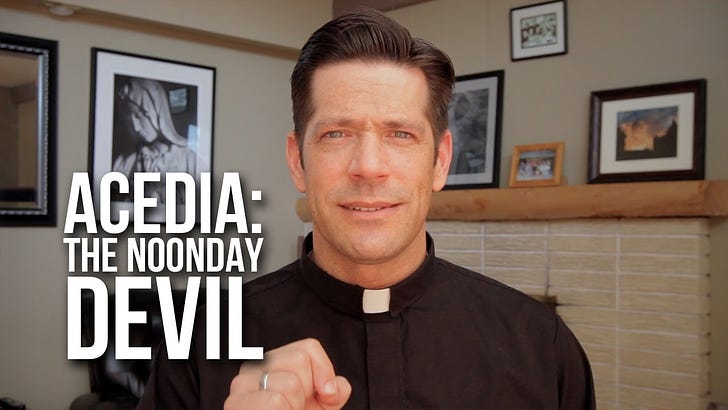Welcome to another Fit Shepherds’ newsletter. In this issue, Fr. Max Behna, a parochial vicar at St. Michael’s Parish in Wheaton, offers a splendid summing up of acedia, which is often referred to as sloth. Listen to his audio above. It’s about 8 1/2 minutes long. He offers a definition of acedia and also some solutions to combat this sin, which is known as one of the seven deadly sins.
++++++++++++++++++++
Weariness, melancholy, feeling overworked, discouragement, instability, activism, boredom, or depression: these various manifestations of the “noonday devil” [acedia or sloth] are enough to convince us of the relevance of an evil that caused man to lose his relish for life… Left to his own devices, man ultimately despairs of ever being able to find a meaning for his existence and runs the risk of sinking into mediocrity that is just the symptom of his rejection of his own greatness as an adopted son of God.
— Cardinal Marc Ouellet, the former Archbishop of Quebec
+++++++++++++++++++++++
Consider, for example a man who is a workaholic. Now suppose too that this man has a wife and children. A man in this position has some very significant gifts and duties beyond his career. He is a husband, a father, and the spiritual leader of his home. He is also a disciple, whom the Lord has summoned to new life, to the great discovery of God, and the deepest meanings and realities of his life. He also has the awesome dignity to announce these truths to his wife and children.
But all of the duties and glories of his vocation overwhelm and even scare him. It all seems so irksome and the task too open-ended. Frankly, he doesn’t want to reflect too much, because it might summon him to ponder things he would like to avoid considering, such as moral questions, or priorities, or whether he is really spending enough time with his wife and children, or whether his life is really focused on things that matter most. No, its all just too irksome, too ridden with uncertainty to enter more deeply into the spiritual life. Work is easier, and at work they call him “sir” and do what he says.
So, he buries himself in his work. And this helps him to avoid prayer, and reflection. Of course there is “no time” for Mass or for praying with his wife and children. There is no time for scripture, retreats and the like.
This man is not lazy, but he is slothful. In the end his workaholism is sloth, for it is sorrow and aversion at the gift that the Lord offers him to come out into the deeper waters and lower his net for a catch. His sorrow for spiritual goods, in this case, is manifest by a kind of avoidance rooted in fear. By sloth he is not joyful at the invitation of the Lord or the Church. Instead he is sorrowful and averse to what he sees as toilsome, and possibly as raising uncomfortable things he would rather not look at. He does not hate God or the faith, but it is all just too much.
That said, sloth does often manifest as a kind of lethargy, and kind of boredom that can’t muster any interest, energy, joy or enthusiasm for spiritual gifts. Such people may be enthusiastic about any number of things, but God and the faith are not among them.
To a great extent boredom is elevated in modern times and this fuels sloth. In effect we are hyper-stimulated in the modern world. Our frantic pace, endless interruptions, and the rich abundance of entertainment, fast-paced movies, video games, all are a feast for the eyes but they hyper-stimulate. From the time we awaken to our return to sleep,there is almost never a moment of silence, or a time when we are not being bombarded by images, often flickering and quickly changing.
This hyper-stimulation means that when we come upon things like quiet prayer or adoration, or are asked to listen for an extended period, or when the imagery is not fast changing we are easily bored.
And boredom feeds right into sloth. The “still, small voice of God,” the quiet of prayer, the simple reading of Scripture and pondering its message, the unfolding of spiritual meaning through reflection, the slower joys of normal human conversation in communal prayer and fellowship…none of this appeals to many who are hyper-stimulated, and used to a breakneck pace.
— From Msgr. Charles Pope’s blog
+++++++++++++++++++++
St. Thomas Aquinas gives two separate definitions of acedia: “sadness about spiritual good” and “disgust with activity.” …
By the first definition, acedia is a sin against the gaudium de caritate (the joy of love). This is because acedia is sadness about not just spiritual good in general, but about the ultimate spiritual good—the Beatific Vision itself! For St. Thomas, joy is an affective reaction to a good, whereas sadness is an affective reaction to an evil. The implication for our time begins to reveal itself here, for somehow the soul suffering from acedia comes to perceive the greatest possible good—union with God—as an evil.
How does this come about? As a general answer, St. Thomas says that man can become sad at the prospect of union with God because it requires him to give up limited or apparent (and seemingly more concrete) goods to which he is attached. Acedia is complex, however, and works on many levels and in different forms. We may flee union with God itself, or we may simply flee the things that will lead us to union with God. In the first case, when beatitude itself saddens us, we are dealing with the direst consequence of acedia: despair. …
Those who despair of being able to attain man’s highest vocation, St. Thomas warns, run the risk of becoming satisfied with a mere “animal beatitude.” This is the modern condition, where we are not even aware of our own despair; as Flannery O’Connor put it, our age has “domesticated despair.” We begin to believe that human life is fundamentally absurd. When animal beatitude ultimately fails us, we embrace nihilism, at best with a senile and ineffectual coating of humanism, at worst as an open “hatred of being,” a belief that it would be better not to exist.
Acedia in the Modern Situation
The immoralism of the age of acedia is only in part a matter of pleasure-seeking; indeed, as Joseph Ratzinger writes, “The forbidden joys lose their attraction the moment they are no longer forbidden.” With the loss of meaning, the spiritual instability brought on by acedia manifests itself as a desire to constantly redefine ourselves, to remake human nature as we see fit and to construct all kinds of false “identities.” Because God dwells within us, we can no longer stand to dwell within our true selves; acedia makes us flee our “cell.” Above all, we hate to be alone and quiet, and the innumerable ways we find to distract ourselves need not be mentioned here.
Ultimately, acedia leads us to deny our own potential for greatness. This is the vice of faint-heartedness or pusillanimity, which St. Thomas opposes to the virtue of magnanimity, greatness of soul. Ratzinger connects this with false humility: “Man does not want to believe that God is concerned about him, knows him, loves him, watches over him, is close to him.” Man alternates between “scientifically” reducing himself to just another animal and, contradictorily, believing himself the sole blight on an otherwise perfect natural world. The hatred of being mentioned earlier takes on a peculiar form in the environmentalist fantasy that the salvation of the earth will be man’s disappearance from it.
The false humility in which we say we are not worthy of God’s love (as an excuse to refuse it) is false precisely because “God has loved us” first (1 John 4:10), and this is what makes us worthy. If fashionable talk of man’s insignificance in the universe sounds strangely boastful, it is because it is actually the height of arrogance.
— From an article by Thomas Mirus on catholicculture.org
+++++++++++++++++++++++++
— Fr. Michael Schmitz on acedia









Share this post